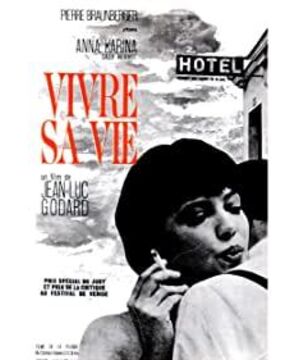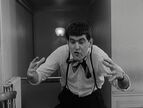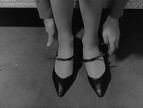Godard begins the film's narrative with Montaigne's line "You must lend yourself to others, but give yourself to yourself". He also said publicly that "As You Like It" "is a film on prostitution that tells how a young and pretty Parisian salesgirl gives her body but keeps her soul." As a prostitute, Nana's expression of lending her body to others is obvious, but how does she retain a part of herself, or in other words, how does she retain her soul? How does Godard reflect it through the film? In this regard, Susan Sontag wrote directly in the article "Against Interpretation" on "Do As You Like It": "But if we ask, how has Godard shown us Nana keeping herself for herself, the answer is: he has not shown it." The answer is that he doesn't show it directly...which is confusing! (I didn’t understand half of the movie, and I still didn’t understand Sontag’s article. Hahahahaha.)
Godard also said of the film, "I wanted to show the 'adventures of Nana so-and-so' side of it ...How can one render the inside? Precisely by staying prudently outside." The inner way is not to dig into her heart. The entire film does eschew all psychological characterizations, much like a documentary, which makes it hard to fathom. This sentence also clearly points to the story about chickens told by Nana's ex-husband Paul in the movie: The chicken has an inside and an outside. Remove the outside and you find the inside. Remove the inside, and you find the soul. Na Na is like a chicken, like a Russian nesting doll, first outside, peeling the outside is inside, but you need to peel off the inside to see the soul hidden inside. But we, as the audience, were placed outside the oustide by Godard, and there was no way to unscrew the nesting doll.
Sontag felt that Nana rejected her old identity, and the moment she took off her clothes and became a prostitute was when she stripped off her outside, and her outside was her old identity. Although Sontag did not continue to explain Nana's inside, but according to her thinking, it can be understood as Nana's new identity, who is a prostitute, that is, her inside. So I guess when Nana rejects her inside, it's when her soul comes out.
Unlike her friends Yvette and most of the prostitutes represented by Yvette, who think she is helpless to be a prostitute, forced by a bad husband and a child who is waiting to be fed, and forced by a miserable life, Nana feels that it is her choice to become a prostitute, and Others don't care. She is free, she has the right to choose, and she is responsible for all her actions. The power of free choice that Nana reserves for herself, the symbol that she keeps her soul to herself.
I think we're always responsible. We're free. I raise my hand – I'm responsible. I turn my head – I'm responsible. I am unhappy – I'm responsible. I shut my eyes – I'm responsible. I forget I'm responsible, but I am.
Nana felt that being a prostitute was her choice, and not being a prostitute was her freedom. So when she met the young man and fell in love, she chose to give up her prostitute status. Nana is about to strip her inside, and we catch a brief glimpse of the soul in it. She asked Raoul what he had done wrong in the car that Raoul was taking to the location of the deal. Raoul said "You must take anyone who pays", and Nana immediately refused ""Not anyone. Sometimes it's degrading". As a prostitute, Nana still retains the right to choose guests and the right to "conform to good". Her Choice, her freedom, and the dignity in her soul are wrong in the eyes of others. Nana has indeed taken responsibility for this and paid the price of her life.
To sum up, when Nana chose to leave her outside (her old identity) and then strip her inside (her prostitute identity), we saw the soul she kept for herself (she lived "as she wanted") freedom and responsibility). That's probably how I understand Nana, and what Godard and Sontag said about the film.
View more about Vivre Sa Vie reviews










